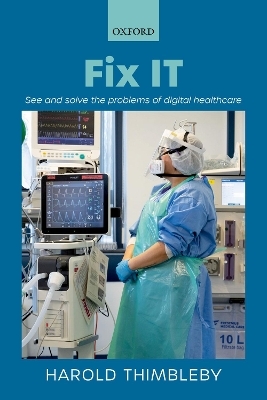
Fix IT
Oxford University Press (Verlag)
978-0-19-886127-0 (ISBN)
Until digital healthcare improves, digital risk means that patients may be harmed unnecessarily, and healthcare staff will continue to be blamed for problems when it's not their fault.
This book tells stories of widespread problems with digital healthcare. The stories inspire and challenge anyone who wants to make hospitals and healthcare better. The stories and their resolutions will empower patients, clinical staff and digital developers to help transform digital healthcare to make it safer and more effective.
This book is not just about the bugs and cybersecurity threats that affect digital healthcare. More importantly, it's about the solutions that can make digital healthcare much safer.
Prof Harold Thimbleby is See Change Fellow in Digital Health, based at Swansea University, Wales. He is Expert Advisor on IT to the Royal College of Physicians, a member of the World Health Organization's Patient Safety Network, and an advisor to the Clinical Human Factors Group and to the UK Medicines Healthcare products Regulatory Agency (MHRA). Although a professor of computer science, he is an Honorary Fellow of the Royal College of Physicians, the Edinburgh Royal College of Physicians, and of the Royal Society of Arts; he's also a fellow of the Royal Society of Medicine. He has been a Royal Society-Wolfson Research Merit Award Holder and a Leverhulme Trust Senior Research Fellow, and he is 28th Gresham Professor of Geometry. Harold won the British Computer Society's Wilkes Medal and his last book, Press On: Principles of Interaction Programming (MIT Press), won several international awards.
1: How to read this book
PART 1: Diagnosis - riskier than you think
2: We don't know what we don't know
3: Cat Thinking
4: Dogs dancing
5: Fatal overdose
6: Swiss Cheese
7: Victims & second victims
8: Side-effects and scandals
9: The scale of the problem
10: Medical apps and bug blocking
PART 2: Treatment - Finding solutions
11: Cars have got safer
12: Safety Two
13: Computational Thinking
14: Risky calculations
15: Who's accountable?
16: Regulation needs fixing
17: Safe and secure
18: Who profits?
19: Interoperability
20: Human Factors
21: Computer Factors
22: User Centered Design
23: Iterative Design
24: Wedge Thinking
25: Attention to detail
26: Planes have got safer
27: Stories for developers
28: Finding bugs
29: Choose safety
Part 3: Prognosis - a better future
30: Signs of life
31: The pivotal pandemic?
32: Living happily ever after
33: Good reading
34: Notes
35: Healthcare openness and acknowledgements
| Erscheinungsdatum | 17.07.2021 |
|---|---|
| Verlagsort | Oxford |
| Sprache | englisch |
| Maße | 155 x 233 mm |
| Gewicht | 980 g |
| Themenwelt | Informatik ► Weitere Themen ► Bioinformatik |
| Medizin / Pharmazie ► Gesundheitswesen | |
| Studium ► Querschnittsbereiche ► Epidemiologie / Med. Biometrie | |
| Studium ► Querschnittsbereiche ► Prävention / Gesundheitsförderung | |
| ISBN-10 | 0-19-886127-3 / 0198861273 |
| ISBN-13 | 978-0-19-886127-0 / 9780198861270 |
| Zustand | Neuware |
| Informationen gemäß Produktsicherheitsverordnung (GPSR) | |
| Haben Sie eine Frage zum Produkt? |
aus dem Bereich


